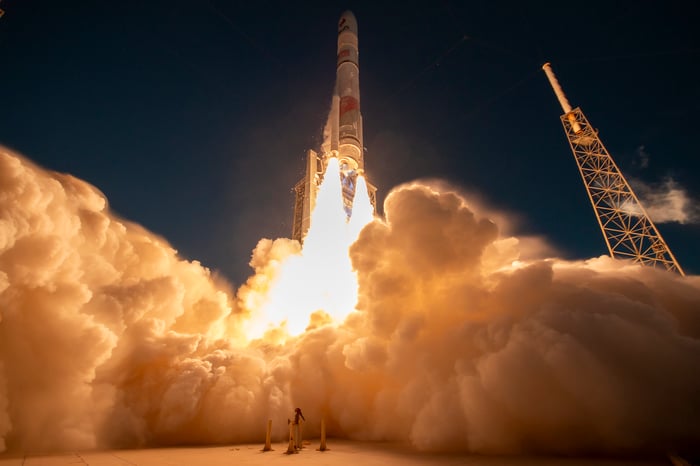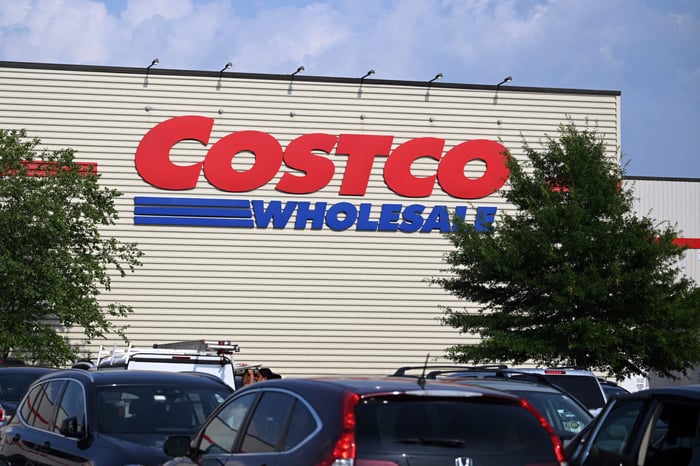Boeing Faces Mixed Signals as ULA’s Launch Encounters Challenges
Boeing (NYSE: BA) investors found themselves in a tricky spot recently.
Boeing owns 50% of United Launch Alliance (ULA), with Lockheed Martin (NYSE: LMT) holding the other half. Many anticipated a boost for Boeing when ULA’s Vulcan Centaur heavy-lift rocket launched successfully for the second time this month.

Image source: ULA.
However, the term “successfully” is worth questioning.
The photo shows two large flames, indicating the GEM 63XL solid rocket boosters (SRBs) in action, provided by Northrop Grumman (NYSE: NOC). These boosters are essential for lifting the Vulcan rocket into orbit before detaching, allowing the main engines from Jeff Bezos’ Blue Origin to take over.
Yet, during the launch, one of the rocket’s nozzles unexpectedly fell off.
A view from @dwisecinema https://t.co/1gdS8FOXoW https://t.co/1Ni6yyTWZ1 pic.twitter.com/7foZTq75Gf
— Chris Bergin-NSF (@NASASpaceflight) October 4, 2024
Launch Evaluation: Mixed Outcomes
On the positive side, the nozzle’s loss only slightly impacted the rocket’s performance. Fuel continued to burn, and the rocket was still propelled downward, though not precisely.
ULA CEO Tory Bruno explained to SpaceNews that the nozzle issue led to a loss of “less than 2% of the total impulse of the booster.” Despite this, Vulcan Centaur managed to reach its orbit successfully, with Bruno noting it was likely the company’s “most accurate injection yet.”
The Federal Aviation Administration (FAA) appeared to share this sentiment.
According to Ars Technica, the FAA quickly concluded that “no investigation is warranted at this time.” This decision contrasts with the FAA’s response to SpaceX’s less severe issues, like less-than-perfect landings of reusable rockets.
In a lighthearted comment, Ars’ Eric Berger noted: “FAA says nah, we’re good.”
FAA says nah, we’re good, after Vulcan booster issue. https://t.co/C0IItscd4C
— Eric Berger (@SciGuySpace) October 4, 2024
Impacts on Boeing and Lockheed Martin Investors
Boeing and Lockheed investors breathed a sigh of relief after the launch.
Vulcan needed two successful flights to gain FAA certification for U.S. Space Force missions. ULA’s ability to move forward without repercussions means they can start lucrative satellite launches for the U.S. government and agencies like the National Reconnaissance Office.
This development could substantially benefit ULA’s business, which has secured contracts for at least 25 national security missions through 2027. With additional agreements to launch Amazon’s Project Kuiper satellites, ULA aims for at least 20 launches per year in the coming years.
Even with a projected launch cost below $100 million, this activity could generate billions in revenue for both ULA and its owners.
On the flip side, if the FAA changes its stance and requires fixes for the rocket’s issues, certification could be delayed, impacting ULA’s revenue and, by extension, Boeing’s and Lockheed’s profits.
However, this situation isn’t a make-or-break moment for ULA, Boeing, or Lockheed. Bruno assured investors that such anomalies are not new to him and he is confident in resolving the issue quickly.
Resolving this matter swiftly would allow ULA, Boeing, and Lockheed Martin investors to start realizing significant returns from their investments in this rocket.
Investing Considerations for Boeing
Thinking about investing in Boeing? Here’s a point to ponder:
The Motley Fool Stock Advisor analyst team recently identified what they consider the 10 best stocks for investors to buy now, and Boeing isn’t among them. The stocks on this list hold potential for substantial future returns.
Consider the success of Nvidia when it made this list on April 15, 2005. If you had invested $1,000 at that time, you’d now have $839,122!
Stock Advisor provides an accessible path for investors, with guidance on portfolio building, regular updates, and two new stock recommendations each month. Since 2002, it has more than quadrupled the S&P 500’s return.
See the 10 stocks »
*Stock Advisor returns as of October 14, 2024
John Mackey, former CEO of Whole Foods Market, an Amazon subsidiary, is a member of The Motley Fool’s board of directors. Rich Smith has no position in any of the stocks mentioned. The Motley Fool has positions in and recommends Amazon. It also recommends Lockheed Martin.
The views and opinions expressed herein are those of the author and do not necessarily reflect those of Nasdaq, Inc.









